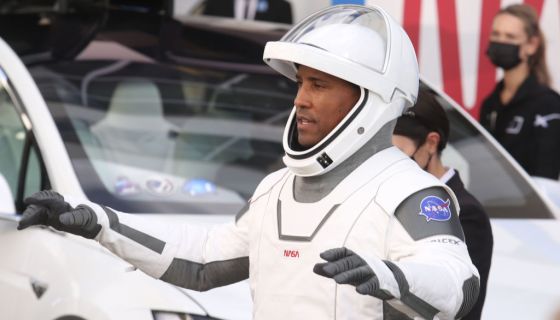Victor Glover became the first Black astronaut to serve as a crew member at the station on Sunday (Nov. 15) when he boarded a SpaceX Crew Dragon capsule named Resilience and rocketed up to the International’s Space Station.
The New York Times reported that Glover will spend about six months at the station and will eventually be joined by decorated astronaut Jeanette Epps next year. She will then become the first Black woman to stay at the International Space Station. History is being made across the globe and in outer space as Black people are setting new records for exploration and discovery.
Victor Glover has spent decades training for the opportunity to live on the space station by getting master’s degrees in flight test engineering, systems engineering and military operational art and science before joining the astronaut corps in 2013. Glover’s path was clear, and he made sure he focused on attaining every goal.
The California native and father of four is a Navy commander and has spent years as a test pilot awaiting the chance to spend time at the International Space Station. Not to be mistaken as the first Black person to visit the station, but he will be the first to live there for an extended time.
Glover discovered he would be joining the astronaut program while working for the late Senator John McCain.
Glover’s accomplishment is monumental as he joins 14 of the more than 300 NASA astronauts sent to space who have been Black. Though Black scientists have played pivotal roles in the process of getting people into space throughout NASA’s entire history, as we watched in the film Hidden Figures. In June, NASA renamed its Washington, D.C. headquarters after Mary W. Jackson, a Black woman who was integral in getting American astronauts into space.
There have been quite a few firsts in the history of space and the astronaut program. In the 1960s, Air Force test pilot Ed Dwight was the first Black American to be involved in the astronaut program, but he never actually made it to space. In 1983, Guion Bluford was the first Black American sent to space when he joined the Challenger space shuttle. In 1992, Mae Jemison became the first Black woman to make it to space.
Glover understands the responsibility he has to speak on social political issues Black and Brown people are faced with today. This summer he spoke on his role as a Black astronaut and shared his thoughts on the protests over the killing of George Floyd. He has even contributed to diversifying the astronaut program by working with other Black astronauts.
During a press conference on Monday, Glover spoke at about being the first Black astronaut to live on the space station.
“It is something to be celebrated once we accomplish it, and I am honored to be in this position and to be a part of this great and experienced crew. And I look forward to getting up there and doing my best to make sure, you know, we are worthy of all the work that’s been put into setting us up for this mission,” he said.
Glover continues to shine a light on the lack of diversity and inclusion within the program. He also speaks on the election and how there is more work to be done for him personally and in the country.
“You know, unlike the election — that is in the past or receding in the past — this mission is still ahead of me. So, let’s get there, and I’ll talk to you after I get on board.”
Victor Glover makes historic leaps while pursuing his passion in space. The mission has just begun, and there is definitely more work to be done on Earth and in space. Glover keeps each mission in mind both exploring and educating Black people one day at a time.







